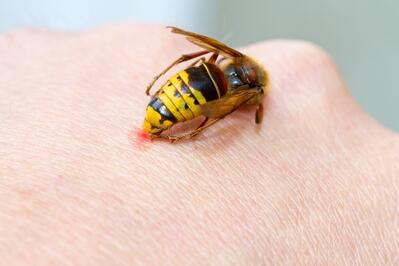Honeybees, wasps , hornets and yellow jackets are known for their stings. It is very important to understand the difference between a normal immune reaction and an allergic reaction, which needs immediate treatment.
Reactions to stinging insects can be divided into three groups: a local reaction that is confined to the sting area and includes: pain, swelling and redness. This is considered a “normal” immune response to the venom of the sting insect. A large local reaction will include areas of the body that are not close to the sting site (for example, a sting on a wrist and the entire arm swells), usually worsens for 2-3 days and can last for a week. A life- threatening reaction, also known as a systemic reaction or anaphylaxis, may include a variety of symptoms such as: face/throat or tongue swelling, difficulty breathing/swallowing, dizziness, stomach cramps, nausea, diarrhea, flushing, unconsciousness, itching and/or hives. An allergic reaction occurs when the body “overreacts” to the venom. It is possible to have an allergic reaction to insect stings after many normal reactions
It is estimated that 40 people die in the United States yearly from insect stings. The majority of the stings around our area are from yellow jackets, paper wasps, honeybees, and hornets. These insects are most active in the late summer and early fall.
It is important to see an allergist if you believe you have an insect allergy. Your allergist will take a detailed history followed by allergy testing (skin testing and/or blood tests) to confirm your sensitivity. If you are diagnosed with an insect allergy you must always carry with you auto-injectable epinephrine, (epipen or Auvi-q), as this is the only medication that can treat a life-threatening reaction. Your allergist will also discuss, if appropriate, venom immunotherapy, or insect allergy shots. This is an effective long term treatment that can help prevent any future life-threatening reactions. If you have an anaphylactic reaction, inject epinephrine immediately and call 911.
Insect avoidance measures are helpful for everyone to follow. When eating outside, keep all food covered, avoid garbage containers, do not drink from open drink cans, especially sweet drinks such as soda and juice. Clothing choices are important. Wear long pants and long shirt sleeves that are not brightly colored or have a flowery pattern and do not walk barefoot, especially in the grass. Avoid wearing perfume, hairspray and deodorant that is sweet smelling. (In other words, avoid looking and smelling like a flower!). If a nest is spotted near the home, have a professional exterminator inspect and remove the nests/insects. And remember, if you spot an insect, remain calm and slowly move away.

